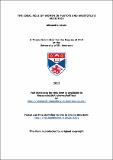The ideal role of women in Plato's and Aristotle's societies
Abstract
This dissertation analyzes Plato’s and Aristotle’s
conception of women’s proper role in the state. The first chapter
demonstrates that due to Plato’s belief that the soul is sexless it is
impossible to determine one’s role in society by one’s sex. Plato’s
claim in the Republic that women who are qualified by nature will
become guardians is therefore consistent with his larger view that
one’s role in society should only be based on one’s nature. Since the
only distinction between male and female Guardians is that women
give birth to children and are physically weaker than men, there is no
justification for barring women from the Guardian class. The second
chapter turns to the Symposium and Plato’s thoughts on intellectual as
well as physical pregnancy, and specifically that according to Plato the
process of giving birth does not affect a woman’s soul or capacity to
reason. In the third chapter I demonstrate that even outside the ideal
city of the Republic, Plato does not revise his position on women’s
capacities. The Laws is more concerned with practicality than the
Republic and Plato is therefore forced to make concessions which limit
women’s opportunity to govern, but such concessions are minor. This
chapter also emphasizes Plato’s belief that good laws make good
people and describes how this realization enables him to recognize
that the poor condition of the women in Classical Athens is due to
Athenian social institutions and not to women’s inferior nature. Finally,
the fourth chapter turns to Aristotle and seeks to prove that his
position on women’s role in the state is far more nuanced than
appreciated.
Type
Thesis, MPhil Master of Philosophy
Collections
Items in the St Andrews Research Repository are protected by copyright, with all rights reserved, unless otherwise indicated.

